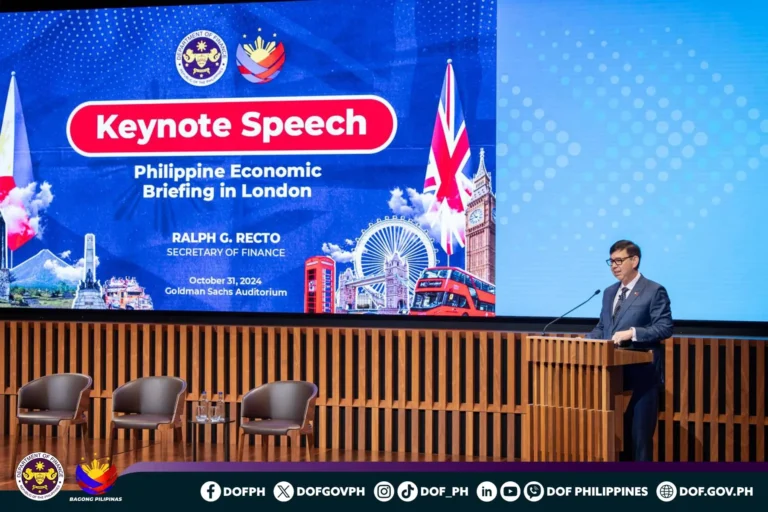Finance Secretary Benjamin E. Diokno delivered an intervention in response to the global economic updates and risks and shared the Philippines’ strategies before ASEAN member states during the 10th ASEAN Finance Ministers and Central Bank Governors Meeting (AFMGM) on August 25, 2023 in Mulia Hotel, Jakarta, Indonesia.
The AFMGM, chaired by Indonesian Finance Minister Sri Mulyani Indrawati and Bank of Indonesia Governor Perry Warjiyo, aims to monitor the deliverables of the Working Committees and gathers Ministers and Governors for discourse on global and regional outlook and development challenges.
“While the ASEAN economies continue to be a major engine of global economic growth, policymakers must remain vigilant of multiple external risks faced by the world economy. These include rising geopolitical tensions, monetary policy tightening, elevated domestic inflation, and climate change,” Secretary Diokno said during his intervention.
The International Monetary Fund (IMF), World Bank (WB), and Financial Stability Board (FSB) presented the global economic outlook, challenges ahead, and how Asia and ASEAN are projected to fare against ongoing risks.
According to the IMF, while global potential growth is expected to remain low, Asia will continue to drive half of global growth. The WB supported this view, saying that ASEAN’s long-term growth potential remains relatively good and can be boosted with labor reforms, investment in energy transition, and stronger trade.
Secretary Diokno said that sustained investments in infrastructure and social programs; measures to address high inflation; diversification of external markets; enforcement of measures supporting labor and employment; and provision of affordable lines of credit for Micro, Small and Medium Enterprises (MSMEs), fisherfolk, farmers, and local entrepreneurs should be adopted by ASEAN member states to mitigate the impacts of global challenges.
To this end, Secretary Diokno underscored the importance of maintaining solidarity between ASEAN member states through collaborative efforts, such as strengthening the region’s surveillance activities, cooperating on macroeconomic policies, and enhancing regional financial safety nets.
On promoting transition finance, Secretary Diokno welcomed the ASEAN Infrastructure Fund (AIF)’s repositioning as an ASEAN green fund in line with ASEAN’s commitment to promoting environmental sustainability and climate change mitigation and adaptation in the region.
The AIF will commit a higher percentage of its portfolio to green projects––around 35 to 40 percent by 2026 and about 60 to 70 percent by 2030.
“We support the proposal to align the AIF with the ASEAN Taxonomy for Sustainable Finance and to increase the potential of the ASEAN Catalytic Green Finance Facility (ACGF) in attracting foreign investors,” he said.
The ACGF is an AIF initiative that supports governments in preparing and financing infrastructure projects that promote environmental sustainability by combining AIF resources with financing from donors and development partners through co-financing agreements and technical assistance.
In line with this, Secretary Diokno shared that the Philippines has signed the Davao Public Transport Modernization Project––a US$ 1 billion loan with the ADB, which the AIF is co-financing with a US$10 million loan.
The Project aims to utilize electric buses to reduce greenhouse gasses and promote climate action.
“The Project is an example of how ASEAN Member States can benefit from the AIF’s catalytic role in climate mitigation and adaptation initiatives,” Secretary Diokno said.





